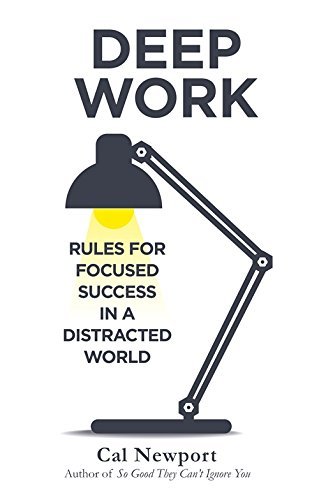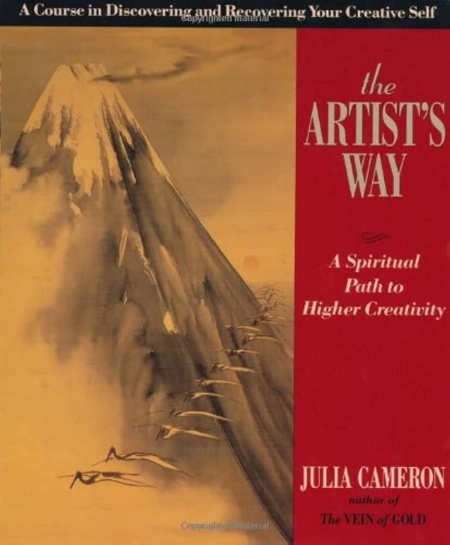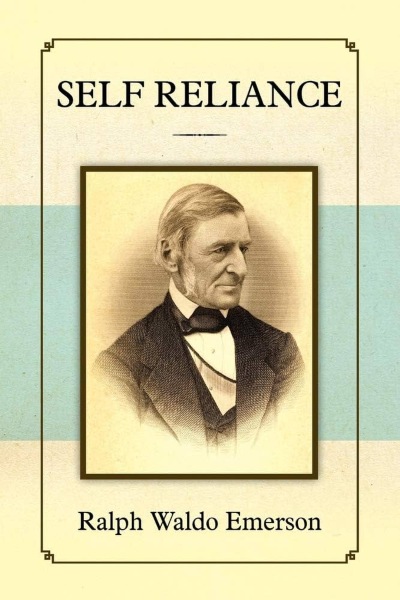The Mountain Is You, Brianna Weist
The Mountain Is You offers a transformative look at how self-sabotage stems from unresolved emotions and limiting beliefs, providing practical tools for personal growth. Through a compassionate and insightful approach, the book helps readers turn internal obstacles into opportunities for self-mastery.
We’ve all heard it before: We are our own worst enemy. In The Mountain Is You, this phrase becomes much more than just a cliché. The book delves deep into the concept of self-sabotage, offering readers a practical guide to understanding and transforming the internal struggles that often hold us back. It’s a self-help book that’s part emotional exploration, part actionable toolkit, aimed at helping individuals identify and overcome the personal mountains we create in our lives.
Living in the Bronx, where life moves fast and ambition runs high, I know what it feels like to face these internal blocks. The constant hustle of city life can magnify the pressure we feel inside, and sometimes the only thing standing in our way is ourselves. The metaphor of the mountain immediately resonated with me when I picked up this book—it’s a powerful image of how we unknowingly create obstacles that limit our growth. But what I didn’t expect was how much this book would illuminate the very core of those challenges, turning what felt like overwhelming barriers into opportunities for self-mastery.
The Core Idea: Our Internal Mountains
The main premise of the book is that self-sabotage stems from unresolved emotional issues, unmet needs, or ingrained limiting beliefs. These behaviours aren’t random acts of destruction but rather signals from our subconscious that something deeper needs attention. In other words, we create the mountain that blocks our path. The book refreshingly approaches self-sabotage as something to be understood and addressed, rather than hated or feared.
The mountain, as described in the book, is entirely internal—it represents our unhealed wounds, suppressed emotions, and deeply rooted fears. These internal struggles are what manifest as procrastination, fear of success, or avoidance. The book encourages readers to see these behaviours as opportunities to heal and evolve, rather than mere failures.
- Self-sabotage is driven by unmet emotional needs.
- The behaviors are signals from our subconscious, not random acts.
- The mountain is internal, representing fears and unhealed wounds.
- Understanding self-sabotage helps to re-frame perceived failures.
- The first step is recognising self-sabotage as an opportunity for growth.
When I reflect on my own experiences, particularly in both my personal and professional life, I see how I’ve built my own mountains. I’ve held myself back at times, not because I wasn’t capable but because I was afraid—afraid of rejection, afraid of success, and sometimes even afraid of change. The book helped me realize that those fears are not signs of weakness; they are signals pointing to areas in my life where growth is possible.
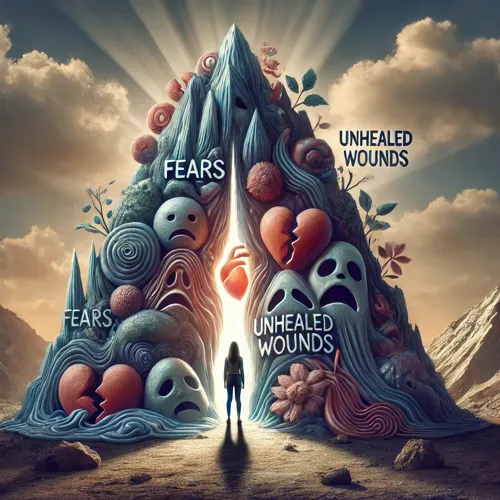
The Journey of Growth
The book is laid out like a journey, guiding readers step-by-step through the process of transformation. Each chapter touches on different aspects of self-sabotage, including fear, uncertainty, and emotional intelligence. The tone is empathetic and insightful, making the material accessible to anyone who has ever struggled with feeling stuck.
One of the most impactful ideas for me was the concept of fear. Here in New York, where the stakes often feel high, fear can be a constant companion. Whether it’s fear of failure or fear of success, these emotions can paralyse us. The book suggests viewing fear as an indication of what matters most, rather than seeing it as something to defeat. It’s not the enemy; it guides us to understand where we need to direct our focus and energy.
“Your new life is going to cost you your old one. It’s going to cost you your comfort zone and your sense of direction. It’s going to cost you relationships and friends. It’s going to cost you being liked and understood. But it doesn’t matter. The people who are meant for you are going to meet you on the other side”

Emotional Intelligence and Responsibility
Two of the most significant themes in the book are emotional intelligence and self-responsibility. Both of these are key to dismantling self-sabotage, and the book offers deep insights into each.
Emotional intelligence, or the ability to understand and manage our emotions, is crucial for overcoming self-sabotaging behaviours. This is crucian in Brianna’s writing. Many of us avoid painful emotions, and in doing so, we inadvertently create bigger problems for ourselves. When we don’t process our emotions, they don’t just go away; they find other ways to surface, often in self-destructive behaviours like procrastination, negative self-talk, or unhealthy habits.
I personally identified with this idea when thinking about how I’ve sometimes delayed taking big steps in my career. What I once chalked up to being “not ready” was really my fear of failure. I wasn’t avoiding the task itself; I was avoiding the emotions tied to potential rejection. The book teaches that by addressing these emotional blocks, we can stop our patterns of self-sabotage at their roots.
The theme of self-responsibility was also powerful. No one else can climb our mountains for us. It’s tempting to blame external factors for our lack of progress—circumstances, other people, or even the pressure of living in a fast-paced city like New York. But the book emphasises that real change only happens when we take ownership of our lives. This message is both empowering and challenging; it forces us to confront the reality that our personal growth is in our own hands.
Practical Tools for Transformation
While the book offers plenty of insight, what sets it apart is its practical approach. The book gives readers actionable steps to start transforming their lives, not just abstract advice. From journaling exercises to reflective questions, the book encourages readers to actively practice the material.
One exercise that had a big impact on me involved identifying “pain points” in my life—areas where I felt stuck or frustrated. I looked deeper into those frustrations and realized they were connected to deeper fears and unresolved emotions. This insight allowed me to take concrete steps toward addressing those issues, both personally and professionally.
The book also emphasises the importance of self-compassion. Often, we’re our harshest critics, and this inner critic can contribute to our patterns of self-sabotage. But self-compassion isn’t about being easy on yourself; it’s about recognising your humanity and allowing yourself space to grow. This was an especially powerful message for me, as I tend to be pretty hard on myself when things aren’t great. The book helped me re-frame setbacks as opportunities to learn and grow, rather than failures to be ashamed of.
“Self-sabotage is when we say we want something and then go about making sure it doesn’t happen.”
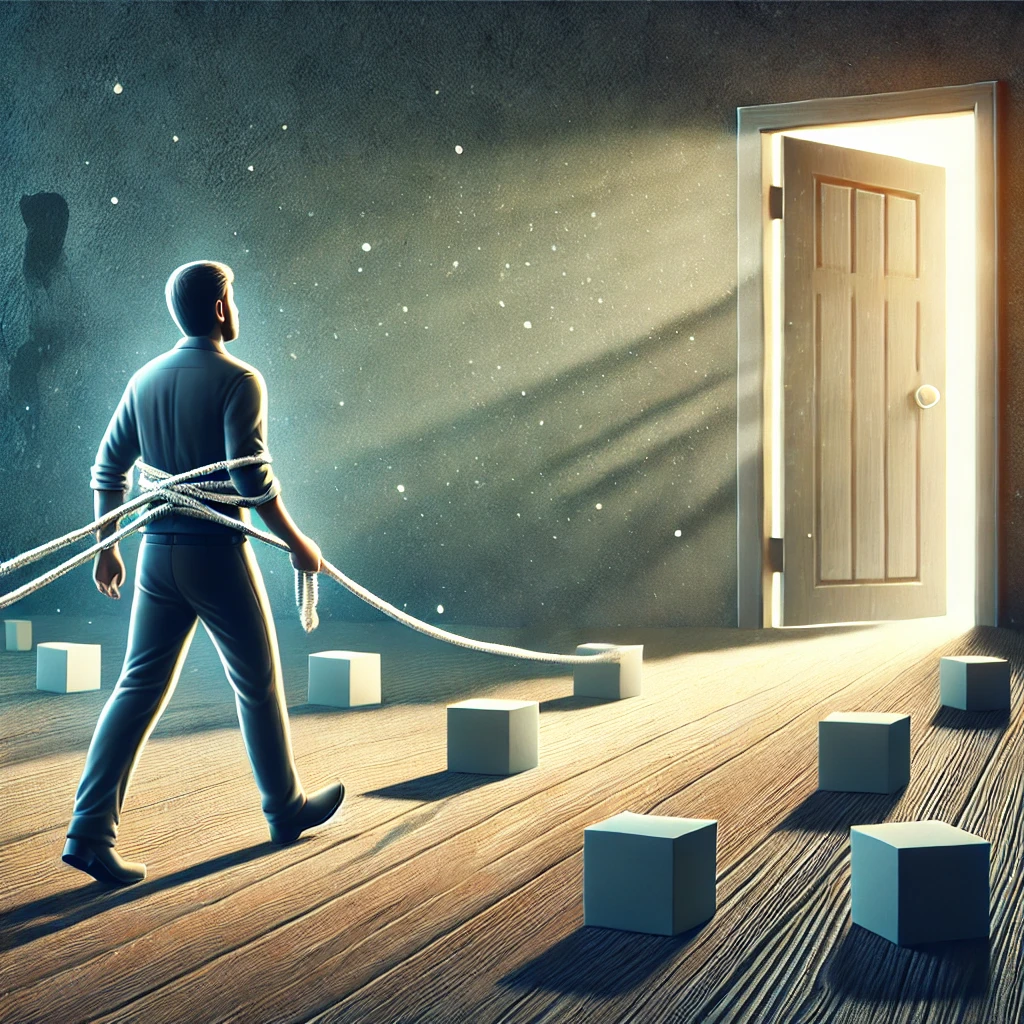
Final Thoughts
The Mountain Is You is a must-read for anyone who feels like they are standing in their own way. It’s a compassionate and insightful guide for transforming self-sabotage into personal growth, offering both emotional insight and practical tools. For me, the book was not just a helpful resource but a call to action. It reminded me that the obstacles I face, both external and internal, are part of the journey to becoming the best version of myself.
If you’re feeling stuck in your career, relationships, or personal growth, this book provides a clear path forward. It’s not about avoiding the mountain—it’s about understanding that the mountain is part of you.

